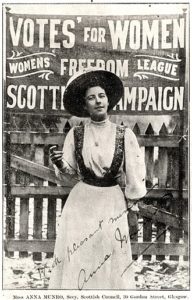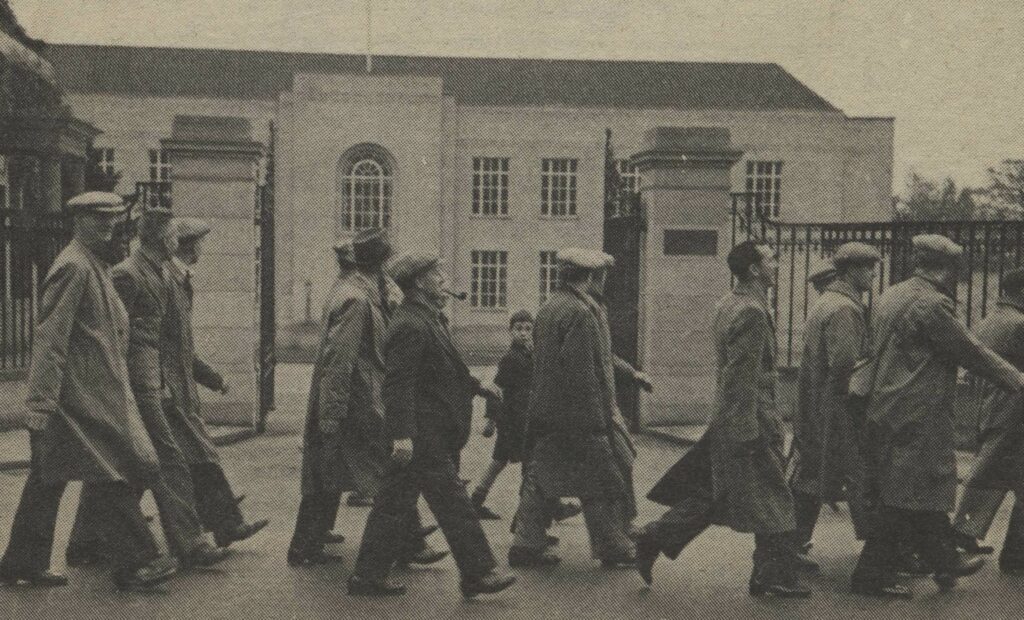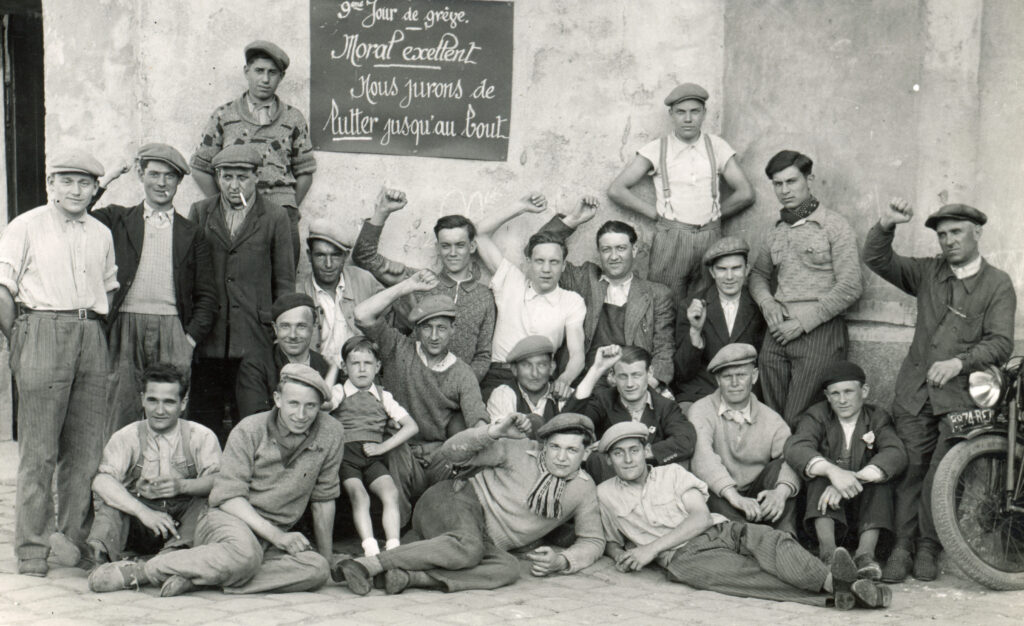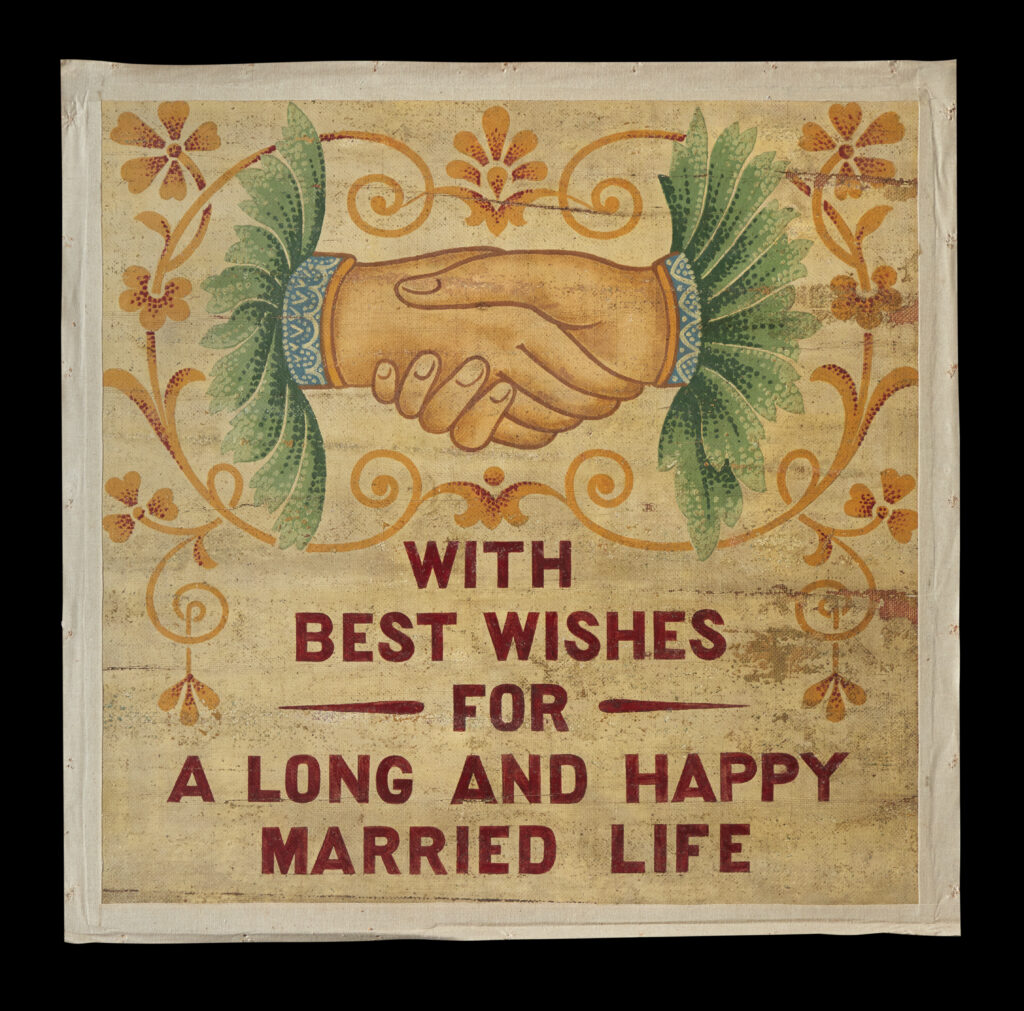This is the second blog from our fantastic volunteer Suzie, in celebration of International Women’s Day

Anna Munro
Anna Gilles Macdonald Munro was born in Glasgow in 1881 and died in 1962 . Her father was a school master and the family lived in Edinburgh until 1892 when Anna’s mother died and then she and her sister, Eva, moved to Dunfermline to live with her paternal Aunt and her husband, Pastor Jacob Primmer.
Having worked for three years for The Sisterhood of the Poor Movement in the East End of London, Glasgow and Edinburgh, Anna was very moved by what she saw. A lifelong supporter of the Labour Party, she served as both chair and president of her local committee. Her fight for female franchise was compassionately rooted in helping women in poverty.
Anna joined the Women’s Social and Political Union (WSPU) in 1906 and became its organiser in Dunfermline. However the WSPU was becoming less democratic and there were concerns that its leadership under Emmeline and Christabel Pankhurst was becoming dictatorial. Anna and several members, including Charlotte Despard and Teresa Billington-Greig broke away and created the Woman’s Freedom League (WFL).
Teresa Billington-Greig was the first Suffragette sent to Holloway. Charlotte Despard was the first woman to refuse to pay taxes as a protest, an action which quickly inspired others to form the Women’s Tax Resistance League (these activities were expanded upon in Apr 1911 when the WFL passed a resolution to boycott the national census protesting against the omission of women’s suffrage for the Kings Speech sending copies of the resolution to Asquith and Churchill. Women householders either spoilt or failed to complete their census forms) In 1907 Anna became Teresa Billington Greig’s personal secretary.
The Women’s Freedom League grew rapidly, and soon had sixty branches throughout Britain with an overall membership of around 4,000 people. This was over twice the size of the WSPU. The WFL also established its own newspaper, “The Vote”
The WFL classed themselves as a militant organisation (over 100 of their members were sent to prison after being arrested on demonstrations or refusing to pay taxes), but unlike the WSPU they refused to attack people or property other than ballot papers. Their actions included protests in and around the House of Commons and other acts of passive civil disobedience such as payment of taxes; their principal being ‘no tax without representation’. WFL activities in 1908 included attempts to present petitions to the king and have deputations received by cabinet ministers while further protests were held in the House of Commons such as Suffragettes chaining themselves to the grille in the Ladies gallery.
In January 1908 Anna took part in a deputation to see Cabinet Minister Richard Haldane. The WFL had petitions protesting against the omission of Women’s Suffrage from the King’s Speech and asked him to use his vote to get the measure passed. When Haldane refused to come out to meet them Anna pinned a large “Votes for Women” flag on the door and told the crowd “OK we will wait for him” and addressed the crowd. The police attempted to move her on and suggested she “go and buy some chocolates” and Anna accused them of impudence, carried on addressing the crowd and was arrested. At her trial she stated “I have come from Scotland for this purpose. I lost my hat yesterday in the crowd, trying to present petition to the King.” On reporting the trial the Dundee Courier claimed her to be “an excellent and fluent speaker”. She was imprisoned in Holloway Prison for six weeks.
A letter in the Aberdeen Press & Journal 5th February 1908 from Pastor Jacob Primmer, Anna’s uncle, to the Home Secretary (Herbert Gladstone) :-
“The Manse, Kingseathill, Dunfermline, 31 Jan 1908
Dear Sir
As the uncle of Miss Anna Munro who at Westminster Court yesterday , got the cruel and vindictive punishment of six weeks imprisonment – while for the same political offence the sentence at Marylebone was 40 shilling or twenty-one days imprisonment and 40 shilling, or one month, as a Suffragist – allow me to point out that for long she has been in delicate and precarious health; that only four weeks ago she fell down in a faint in a Glasgow street; that imprisonment will be most serious in its consequence; that therefore you should order her liberation from prison, and that until that be done she should be kept in the infirmary.
On 8th February E Blackwell responded on behalf of the Secretary of State saying he could find no grounds for releasing her. However her uncle had already received a telegram (S7) saying that she was free after someone had paid surety of £20 (Dundee Courier 12th Feb 1908).
Jacob Primmer responded that his niece had been arrested for
“the awful crime of knocking up some of your fellow Cabinet Ministers at 9:30am and holding outside public meetings until they made their appearance. It was my niece who put the question to the Prime Minister in Dunfermline on 22nd October last –
‘As the Prime Minister believes in Women’s suffrage would he suggest some method we could adopt in order to get our enfranchisement soon? He said I think they ought to go on agitating and holding meetings and pestering people as much as they can, as all other men and women who are interested in public questions have to do.’
Is not, therefore, outrageous and the playing of the tyrant keep them in the common prison among the vilest the nation for following the advice of your superior—the head the Government? Remember that cruelty and intolerance never pay, even the part of a Home Secretary. Is it not farcical to charge a frail and weak young lady with resisting number of elephantine, six feet five inches policemen? And for this awful crime to suffer six weeks Holloway Prison? Doctors and others Dunfermline can bear testimony to the delicate and precarious health of my niece, yet you say that she ‘is fair general health’. This is emphatically contradicted in letter received from her this evening. She writes—‘you know, I came out of Holloway last night after being in ten days. It was either case of that or hospital!’ And she complains suffering from a frightful headache. It would be well if in future you got some honest, reliable person to give you information to the condition those tyrannically cast into prison. I write in the interests of fair play and protect, against your turning the administration of the law into farce.”
On returning to Dunfermline a suffragette meeting was held to welcome Anna back. The principal speakers were “Anna Munro, Dunfermline and Mrs Sanderson, Forfar” both who had suffered imprisonment in Holloway. Anna stated that since her last appearance she had “lost her character and had become a gaolbird”. Describing her arrest, she said they were not guilty of the dreadful things that were read of in the papers. They did not shout, they did not scream; it was an exceedingly dignified matter altogether. At Mr Haldane’s house they pinned a “Votes for Women” flag on the door. Six policemen came along, and they went with them very properly, and did not resist in any way. There was not a single woman allowed into the Court. They asked if she wished to say anything her own defence but when she- had opportunity to say anything was simply shouted down. She did not hear the sentence; she heard murmur from the bench, and then she was removed.
Anna was good at addressing meetings; she was eloquent and charismatic and spoke without notes at many meetings and in December 1908 Anna became the WFL organising secretary in Glasgow. The Scottish Council of the Women’s Freedom League was based at 30 Gordon Street, and also ran a tearoom and bookshop at the Suffrage Centre, originally in Sauchiehall Street and later in St George’s Road.
In 1910 there is a picture/photo of her in prison “garb” saying that she will take active part in the campaign against Mr Churchill during the election. Churchill was first elected MP for Dundee in 1908 after failing to keep his Manchester seat. His re-election in Dundee was fought by the WFL who organised many meetings in December. Churchill did not back women’s suffrage. When asked why he wouldn’t give women the vote or political rights he responded “you have political rights as exercised through your husband.” In December 1910 Churchill visited Dundee. On the 6th December 1910, at the Corn Exchange in Albert Square Dundee, Charlotte Despard and Anna spoke out against Churchill for acting against Liberal principles. Anna is quoted as saying that when Churchill came to Dundee he said ‘Trust me Ladies I am your friend’ but “the ladies did not trust him and his subsequent action proved them correct”.
Also that week in Dundee she spoke at ten different protest meetings at King’s Theatre, Caird Fountain, Baxter’s Works, the YMCA , the High School Gate, Cox’s works, at the Foot of the Town Hall and other venues. She urged the crowds “Put not your trust in princes, neither put in party politicians, and no account put it in Mr Winston Churchill.”
‘
On the day of the election, 25th January, Anna and other suffragettes followed Asquith as he visited polling stations. She warned people that a vote given to him was a vote given for women being sent prison. Petitions advocating votes for women were canvassed at all the polling stations. Anna complained that she was kicked and struck by the Liberal stewards saying ‘that was owing to the bad influence of Mr Asquith’ while at Tayport the women there flocked to the WFL standard and booed and hissed as he left the meeting. She described Mr Asquith as ‘a canting hypocrite and a humbug’
April 19th 1911 in the rooms of the Democratic Unionist Association Anna delivered a lecture to a large crowd on ‘The Women of Today’ –saying the goal society was moving towards was the realisation of the humanity of women not just her duty to marry and bring up children but to develop and use her god given talents.
The WFL were opposed to violent campaigning and in keeping with this organised a 400 mile walk from Edinburgh to London. It was led and organised by actress Florence Gertrude de Fonblanque. The peaceful protest set off on 12th October 1912 from Charlotte Square in Edinburgh marching down Princes Street and was sent off with the largest crowd the WFL had so far attracted. Anna spoke at the meeting saying the women’s movement was more than a passing phase. The aim of the walk was to gather signatures on route to a petition stating: ‘We, the undersigned, pray that the Government will make itself responsible for a Bill to give votes to women this session’. Their first stop on their walk was Musselburgh. The walkers were dressed in brown uniforms and brown felt hats with green cockades and heavy footgear, marching beneath a banner announcing the route and object of the march. They were escorted by a covered van.
Over fifty women marched on to Musselburgh where about 2000 people heard addresses from speakers. The public were attentive and on the whole friendly; however a few missiles were thrown including a bad egg and a few rotten apples. Anna was one of six women who completed the walk. They reported that the only unpleasant experience was in Peterborough where on 8th November a rally of ‘thousands’ of people was disrupted when the stage was rushed and large quantity fireworks were thrown at the speakers and they had to be accompanied out by the police.
The walkers entered London on the 16th November with a welcome parade, apparently over a quarter of a mile in length. It was attended by four or five thousand suffragettes both male and female who were led to Trafalgar Square amidst the stirring strains of ‘ See the Conquering Hero Comes’ and Women’s March composed by Dr Ethel Smyth; a friend of Emmeline Pankhurst. At Trafalgar Square a considerable crowd of people awaited. Mrs de Fonblanque took the petition to Downing Street with the cart containing the signatures; they were admitted although a police cordon had been drawn. At No 10 they were told the petition would be passed to Asquith.
The Prisoner’s Temporary Discharge for Ill Health Act, commonly referred to as the Cat and Mouse Act, was an Act of Parliament passed in Britain under Herbert Henry Asquith’s Liberal government in 1913 when Reginald McKenna was Home Secretary. Asquith was the MP for East Fife and fiercely opposed to women’s rights. The Women’s Freedom League posted a leaflet to “The Police Forces of Britain” urging the police to disregard the bill and to refuse to re-arrest Suffrage prisoners discharged for ill health. It was signed by Anna along with Charlotte Despard, E. Knight, Nina Boyle, A. Underwood and Kathleen Tanner. She also joined a deputation to McKenna along with Eunice Murray to complain about the conditions in jail for poor people. Eunice Murray was president of the WFL in Glasgow and often gave speeches alongside Anna and was the first women to stand for parliamentary election in Scotland.
While attempting to address a meeting at Hyde Park, London, on 5th May 1913 Nina Boyle, head the political and militant department of the Women’s Freedom League, and Anna, were arrested and taken to Crawford Place Police Station. They were jailed in Holloway for 14 days in default of payment of £20 for obstructing the free passage of the highway at Marble Arch, London. After being released, on 19th May, she attended the police station at Marylebone on Monday to bring to the attention of the authorities the conditions in the police van where prisoners of both sexes were conveyed and the behaviour of both men and women were violent, horrible and there were scenes of indecency.
Anna travelled to throughout England to give talks in the WFL horse-drawn caravan, and on one such trip to Thatcham, near Reading, she met Sidney Ashman whom she married in 1913 S1. In December 1918 she became president of the Reading Branch of the WFL
Anna Munro was a supporter of the temperance movement and president of the National British Total Abstinence Movement. After the First World War she became a magistrate in England and president of the Women’s Freedom League.
To find out the sources used in this research please contact localstudies.dunfermline@onfife.com




